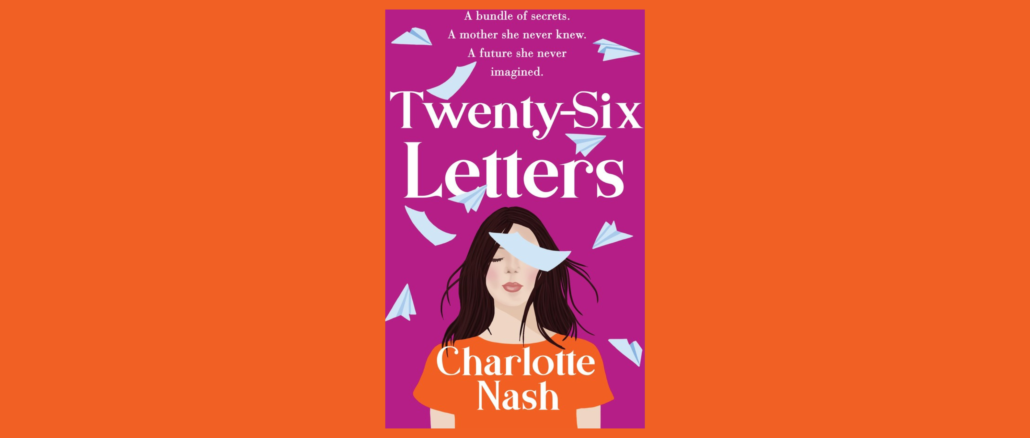
At first glance, the buzzingly modern and indulgent Gold Coast, Queensland, encompassing sublime and eternally summery vistas, is a universe away from a sleepy, yet visually radiantly dream-like and ethereal, English village. Further, a village established in fraught medieval times, and presided over regally and far-reachingly by a lord, even in so-called modern times.
Such seemingly disparate locales, both in origins and identity, have more in common than one would ever consider possible; especially when family dynamics, behaviour and secrets are concreted into the mix.
Such causative ebbs and flows of the human state and psyche are stunningly apparent in English Australian (born in Lincoln, England, whilst having grown up in the Redland Shire of Brisbane) author and engineer, Charlotte Nash’s, soaring and explosive latest novel, “Twenty-Six Letters”.
Set in 2020 on the Gold Coast, Australia, in winter, but predominantly in the quaintly quirky and reserved (fictional) English village of South Bandinby, some three-hundred kilometres north of London, in summer, “Twenty-Six letters” follows the many trials and tribulations of thirty-one year old construction worker, Wilhelmina (Wil) Mann. Wil’s father, Cameron, of Cameron Butler Construction, owns the building company that he, Wil and Wil’s two half-brothers, Col and Tony work for. Wil feels herself to have made one too many mistakes in life (She has at school been a C-grade student and flitted from job to job after leaving school early). Wil has a sister, Kate (a nurse) who is two years older, married with a child and to Wil’s family, has it ‘together’. Wil’s accurate (or is it?) realisation of her failings is compounded when, at the book’s beginning, Wil is arrested during a night out with her unreliable and unappreciative boyfriend, Rob, for assaulting a police officer. Wil’s father, none-too-pleased at Wil’s humiliating plight, rescues Wil from her predicament with some sharp-shooting talking with the police. Wil’s incident leads to Cameron’s lawyer, Bruce Turner, having a meeting with Wil. To Wil’s comprehensive astonishment, Bruce tells her that he has in his file thirteen letters that her Mum, Ann Mann, who passed away when Wil was five, had written to her and wanted her to read each year on birthday until the age of eighteen (Wil already has a letter from her Mum from when she was little). Due to a fire, along with Cameron’s request to withhold the letters from Wil (as Cameron thought the letters would disrupt Wil’s life), Wil is only now receiving the precious letters.
Ann tells Wil, through the letters, of her childhood in the picturesque and simple English village of South Bandinby. Ann further describes to Wil that her parents were ‘peasant’ workers in South Bandinby, a village overseen and owned by Lady and Lord Elston, during Ann’s childhood. Lord and Lady Elston had two sons, Thomas and John. Despite being from classes miles apart (royalty and a ‘commoner’), Ann and John formed a friendship, which later became far more.
Ann’s earnest request to Wil is that she go to the village and find and read further letters, that are in a special place in the old church. Wil, borrowing money, flies to England and sees South Bandinby for herself, a place she feels is so alluring and beautiful, and a place she feels connected to from her first glance at the village.
In the village, Wil encounters Granny Maxwell (who played the church organ, and who Ann used to turn the pages for), Lord Elston (a position now held by the Elston’s son, Thomas) and the swooningly handsome David Hunter, nearing forty (a professional ex-footballer who did his knee in fifteen years ago and now lives in the church cottage and runs the fabulously successful cable show, “Saving History”). Frustratingly, Ann’s letters are not in the place she left them so many years before, but, as Wil finds herself living in David’s cottage, first as friends and then romantically, absent letter after absent letter seems to start turning up unexpectedly and eerily.
What will Wil discover of her mother’s childhood and young life in the letters? When and how did Ann ever leave South Bandinby? How did Ann come to be in Australia? As Ann tells Wil engagingly in the letter meant for Wil’s eighteenth birthday, “Families can be very good at holding secrets. I think it must come from a time when everyone lived in tiny villages, like South Bandinby, and sit next to the same people in church and work with them in the fields, day in and day out. It must have felt safer to keep things quiet. I don’t believe in that. Lives are sometimes ruined for secrets. And I have more than one”.
As Wil gets to know various people in the village and weaves her way into their lives’, what light can the quaintly eclectic (or are they?) characters in South Bandinby shed on Ann’s life? South Bandinby has certainly changed, but is it for the better? Granny Maxwell informs Wil at one stage, “Most of the young people from that (Ann’s) time moved away – they don’t want to work on farms anymore, and the olds retire out somewhere….Most people here now, this is their country house….Live in London all week, then merry on up on the weekends”.
What more will Wil discover of her mother’s upbringing and life, as she reads letter after letter? Will it help her get to know and understand her mother, and will it even shock her? Can Wil finally put her demons of failure and shame to rest? Is there any possibility of a future for David and Wil, considering they ordinarily live such socially wide-apart and geographically distanced lives, and given the fact that a betrayal takes place between them? Who is sending Wil those missing letters? What will the very last letter say?
Charlotte has gifted the reader a spectacularly written and descriptive novel. Full of intelligence, insight, wisdom and courage, “Twenty-Six Letters” is a beautiful, poignant and psychologically nuanced read. I literally couldn’t fault this deftly-observed book, and found myself turning the pages faster and faster the further I got into the book. I can’t wait to see what Charlotte writes next. Bravo Charlotte!


Leave a Reply